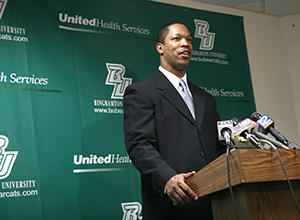
For a sports team, enduring controversy usually requires a strong leader to help them through it. After the Binghamton University athletic department released six players from the program earlier this year, the men’s basketball team went through as big of a controversy as any has; the icing on the scandals was the suspension of head coach Kevin Broadus.
With their leader and mentor gone, the Bearcats needed someone to step up and lead them through the haze of audits, suspensions and six walk-ons. Who better than to take the reins of a program in shambles than a former NBA star, a mentee of Kevin Broadus and the all-time leader in points in the Atlantic-10 Conference; who better than Mark Macon?
Considering where the program was just eight months ago, America East regular season champions, AE tournament champions and NCAA tourney participants, the Bearcats have really done a 180. They return only three players from that title winning squad, none of which are serious offensive weapons. The team mixes six walk-on players with a number of brand new faces and very few scholarship players. In short, can anyone take a program in this bad of shape and make it competitive in games?
Some would assume that his elevation to interim head coach might bring a different approach to head coaching than the past two years, but he will draw on his former mentors, which include coaching legend John Chaney as well as Broadus.
“He is I, and I am him,” Macon said on Broadus’ influence on his coaching. “As you see me, you see him.”
His goal is to continue the style of coaching that Broadus brought to the program the last two years.
“I talk to [Broadus] almost every other day,” Macon said. “He’s always been supportive. The most important thing he’s told me is to keep it simple.”
Broadus has a constant influence on Macon. It is more than a matter of respect from Macon, it has to do with understanding the fact that there are others that have the experience to help him through his first tenure as a head coach.
An element that was lacking in Al Walker’s teams but has been a factor since Broadus took the top job has been the coaching staff as a whole. When Broadus hired his staff, he brought in a staff that would not just assist, but would be actively involved in all aspects of coaching.
With three assistant coaches and a director for basketball operations, Broadus set the tone for a staff that would compliment each other on and off the court. Macon’s approach has been to rely on the staff even more since Broadus’s suspension.
“We have guys that have 50 years coaching ability and experience combined,” Macon said. “I’m still learning; I’ve been around great coaches but I am around great coaches [now].”
Macon brings six years of NBA experience to practice every day. He served for three years as assistant coach under legend John Chaney, who is considered to be among the greatest college basketball coaches of all time, and brings many ideas and aspects to coaching that made Chaney so successful.
“I lose track of time when I start teaching, I could do it all day [because] it’s energizing,” Macon said.
The opponent to success on the court in Macon’s eyes isn’t the other team; it’s his players’ abilities to be successful in the classroom and their hard work in practice. He has said that the wins will come in time and that what he is concerned about is his team improving every day. Success this season is less about wins and more about changing the program in order to have productive student-athletes.
Time is the ultimate test for Macon and at the end of the season, critics should not be looking at the team’s overall record as the measure of progress they should look at the players themselves to see how far they have come in both their play on the court and their efforts in the classroom.


